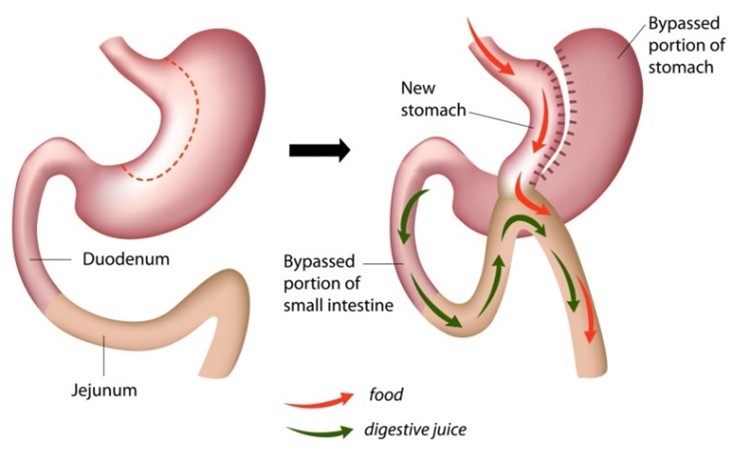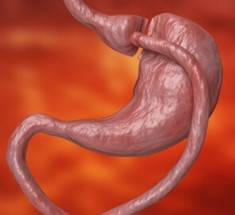Gastric bypass (gastric bypass)
- Obesity is a chronic disease with multiple causes, manifested by an increase in fat storage in the body, and leads to many accompanying diseases.
- The most important causes of obesity: heredity, lack of movement and activity, fast food rich in calories, hormones, the most important of which is ghrelin (the hunger hormone).
- BMI (Body Mass Index): This is the main criterion used in bariatric surgery, and is calculated as follows:
BMI = weight ÷ height squared
Where weight is calculated in kilograms, and height in square meters, the results are classified as follows:
| BMI | Category |
| Less than 20 | Minus weight |
| 20-25 | Normal |
| 26-30 | Weight gain |
| 30-35 | Obesity |
| 36-40 | Very Obese |
| Over 40 | Morbid Obesity |
- Obesity causes many complications, the most important of which are: diabetes – hyperlipidemia – high pressure – heart disease – sleep apnea – articular pain and an increased risk of degeneration of joints bearing body weight such as the hip and knee – polycystic ovary – poor fertility.
- Obesity also predisposes to many cancers, the most important of which are: breast cancer – colon cancer.
- The gastric bypass operation is considered one of the basic and reference operations in the treatment of obesity and weight loss, through which excess weight is eliminated and also outperforms the gastric sleeve operation with results.
- The advantage of this type of operation is that excess weight is lost quickly and clearly compared to other operations, and it is the most successful operation in weight reduction.
Types of gastric bypass surgery
There are several types of gastric bypass surgery:
First: Converting the traditional route:
- It was relied upon in the past, but now other types have appeared that are a better alternative to diverting the traditional (classical) route.Second: Divide the two-split path:

The process of converting a two-way path is a division
One of the most recent diversions,
It was called by this name because it is divided
Food entry into two pathways:
The first is the usual course of food.
Second: Food passes from the stomach to the end
directly into the small intestine, bypassing this
A large portion of the intestinal space.
The two-step process of converting a dual-split path includes:
Gastric sleeve, in addition to making a connection between the lower part of the stomach and intestine, which is carried out according to two stages:
The first stage: called sleeve gastrectomy, in which a large part of the stomach (about two thirds of the stomach) is removed.
The second stage: Gastric bypass, in which a path (connection) is made between the stomach and the small intestine, resulting in a reduction in the proportion of food and calories absorbed into the circulatory system.
Third: Mini gastric bypass:

This process is done by isolating a large part of the
The stomach is then turned into a tube and connected to the intestine
minute, so that it becomes the size of the stomach that can be
Less food reception.
It has become one of the most widespread technologies, which
It distinguishes it from other operations in that it can be returned
For original condition and stimulating results.
It is also performed in a shorter time and has the same effect. It is performed endoscopically, and it takes less than an hour, and the patient stays in the hospital for only one day.
Features and benefits of gastric bypass surgery
The operation with the most success rate in treating comorbidities caused by excessive obesity, such as diabetes and arterial pressure.
Bypass operations are appropriate for people with chronic GERD.
Weight is lost quickly and significantly.
Makes the calories absorbed by the body less than normal.
Gastric bypass surgery is best if:
Increased body mass index to more than 35.
Diabetes and sleep disorders.
Difficulty controlling the level of sugar in the body with a high body mass index between 30-35.
How long does gastric bypass surgery take?
Gastric bypass surgery takes between one and a half to three hours.
Gastric bypass surgery results
Gastric bypass surgery helps to lose a large percentage of excess weight, up to about 70% within a year and a half, and also through this process, the risk of disorders caused by excessive obesity is reduced, the most important of which are:
- Infertility.
- Strokes.
- Diabetes.
- Sleep and snoring problems.
- Heart disease.
- High blood pressure.
- Excessive fat and cholesterol.
Gastric bypass surgery success rate
Studies have shown that patients may lose 30-40% of their excess weight in the first six months after the operation, and 60-70% within a year.














